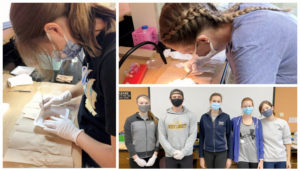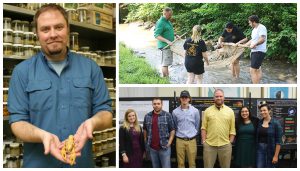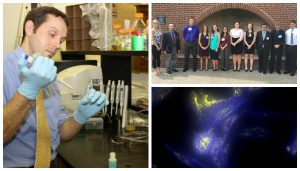Department of Biological Sciences
For a small university, the WLU Department of Biological Sciences offers a wealth of opportunities for undergraduate research. The students involved in this research are not only rewarded monetarily, but they also gain valuable research experience and have the opportunity to present their findings at a state, national, and international level.
Some of the current research projects at WLU include:
Freshwater Crayfishes
Dr. Zachary Loughman
Research in the Loughman Lab focuses on crayfish natural history, taxonomy, and conservation biology, with an emphasis on crayfishes that occur in West Virginia. To do this, Loughman and West Liberty University Biology students travel throughout West Virginia and the southeastern United States surveying crayfishes.
The ultimate goal of this research is elucidating the natural history of these enigmatic animals. By understanding distribution and potential environmental threats to crayfishes, conservation recommendations and actions ultimately will be more useful and efficient.
In addition to this work, we study the ecology of high elevation burrowing crayfishes, investigate the systematics of the Cambarus robustus complex, and maintain the West Liberty University Astacology Collection which currently houses 1,500 lots of catalogued crayfishes from across West Virginia and the southeastern United States.
Francisella Tularensis
Dr. Joseph Horzempa
Craniosynostosis
Dr. Holly Racine

Dysregulation of normal bone development can lead to debilitating skeletal disorders including skeletal dysplasia’s and craniosynostosis. Craniosynostosis (CS) is the premature fusion of one or more cranial sutures. CS leads to abnormal structure and function and is associated with increased pressure inside the cranium leading to abnormal neurogonition, behavior, and vision. The prevalence of CS in humans is 1 in every 2,500 births, with a reported rising prevalence. Recent work suggests that thyroid-related mechanisms may have a strong impact on the development of CS. Specifically, increased circulation of maternal thyroid hormone (TH), or thyrotoxicosis, increases the chance that infants will develop CS. The goal of the Racine lab is to evaluate TH regulation in target tissues from chicken embryos with induced-thyrotoxicosis to validate a model for TH-related CS. This model can be used to establish the mechanism for TH-related CS by analysis of gene expression and skull morphology.

